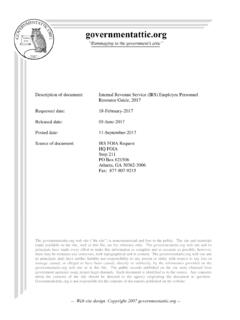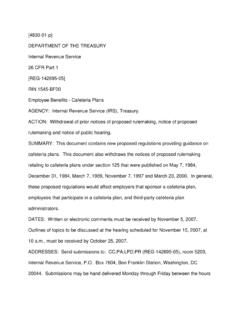Transcription of Internal Revenue Service Department of the Treasury
1 Internal Revenue ServiceNumber: 200130015 Release Date: 7/27/2001 Index Number: Department of the TreasuryWashington, DC 20224 Person to Contact: Telephone Number: Refer Reply To:PLR-128287-00/CC:TEGE:EB:ECDate:April 26, 2001 X= Plan= Employees = This is in response to your request for a ruling for X, a municipality, regarding thecashout of future vacation leave under the Plan by employees of X.
2 Vacation leave isearned on a monthly basis on the first day of each month. Employees may carry overunused vacation hours into following years, subject to maximum limitations. Within acalendar year, employees are allowed to accrue vacation hours beyond the maximumlimits only if used within that year. Employees with unused vacation time on the date oftheir separation from Service receive a cash distribution equal to the number of hours ofunused vacation leave multiplied by their then current rate of pay. X has entered into a collective bargaining agreement with certain bargaining unitemployees.
3 Under the terms of the agreement, employees will be allowed to cash outsome excess vacation hours prior to separation from Service under the terms of thePlan. Under the Plan, an employee would have an opportunity to elect irrevocably atany time on or before December 31st of each year to receive cash for part or all of theamount of vacation hours that would otherwise accrue in the immediately following sixmonth period, but not to exceed 40 hours for each six month period. For example, inYear 1, an eligible employee can irrevocably elect to receive payment for 40 hours thatwill be earned from January 1 through June 30, Year 2, and payment for another 40hours that will be earned from July 1 through December 31, Year 2.
4 To be eligible tomake the election, the employee must have at least 56 hours of accrued but unusedvacation leave to carryover to the year in which the vacation is cashed out. Anyvacation time actually taken by the employee will be subtracted first from any carryoverhours which existed at the end of the prior year and then from vacation hours accruedin the current year for which no election has been made. The election shall be made by2 PLR-128287-00filing a written notice with X. The election is only valid for one year, therefore, anemployee must make a new election by December 31st with respect to vacation accruedduring the next calendar year.
5 The election is irrevocable, and the employee canneither increase (if fewer than 40 hours were originally to be paid out) nor decrease thenumber of hours for which payment will be addition, any employee who has both completed at least 16 years of servicewith X and who has also reached the maximum number of carryover vacation hoursmay, in lieu of the election discussed above, elect at any time on or before December31st of any eligible year to receive payment for all vacation hours that would otherwiseaccrue in a defined 36 consecutive month period (the increased pay period )
6 , startingas of the first of the month in the following year and continuing for 36 months. Theemployee must meet both the Service and maximum hours requirements at the time theelection is made. The foregone vacation hours would be valued and paid out monthlyat the hourly rate then-applicable to the employee during each month. This electioncan be exercised only once during an employee s career. If an employee who hasmade this election continues in Service after the end of the initial 36-month period, theemployee can irrevocably elect before the end of the first increased pay period toextend the election for up to an additional 36 consecutive months.
7 This extensionwould be allowed only once. The only paid vacation time available to an employeeduring the increased pay period would be from vacation hours accrued before andcarried over to the increased pay period. The employee can elect to discontinuepayment of vacation earned during the increased pay period. This election would applybeginning on January 1 of the following year during the increased pay period. Theelection to discontinue the cash-out of foregone vacation hours is irrevocable for theremainder of the employee s Service with 451(a) of the Internal Revenue Code and section (a) of theIncome Tax Regulations provide that an item of gross income is includible in grossincome in the taxable year in which it is actually or constructively received by a taxpayerusing the cash receipts and disbursements method of accounting.
8 Under (a) of the regulations, income is constructively received in the taxable yearduring which it is credited to a taxpayer's account, set apart or otherwise madeavailable so that the taxpayer may draw on it at any time. However, income is notconstructively received if the taxpayer's control of its receipt is subject to substantiallimitations or general, where a taxpayer has entered into a binding contract or agreement todefer income before it is earned, the amounts deferred are not includible in income by acash basis taxpayer until it is received.
9 See Veit v. Commissioner, 8 919(1949); Oates v. Commissioner, 18 570 (1952), aff d 207 711 (7th Cir. 1953). Under the Plan, an employee makes an election to receive payment for vacationin the year before the vacation is earned. This mere right to make the election does not3 PLR-128287-00trigger the constructive receipt of income for eligible employees. Based on the information provided and the representations made, we concludethat: 1. Under the constructive receipt doctrine of section 451 of the Code, the mereright of an employee to make an election under the Plan shall not result in taxableincome for the employee under the cash receipts and disbursements method ofaccounting if the employee chooses not to make such an Under the constructive receipt doctrine of section 451 of the Code.
10 Anelection under the Plan made by an employee to cash out part or all of the employee svacation leave that will be earned in a future year shall not result in taxable income forthe employee under the cash receipts and disbursements method of accounting untilthe taxable year in which the amounts are actually paid or otherwise made available. This ruling is directed only to the taxpayer(s) requesting it. Section 6110(k)(3) ofthe Code provides that it may not be used or cited as accordance with the Power of Attorney on file with this office, a copy of thisletter is being sent to your authorized rulings contained in this letter are based upon information andrepresentations submitted by the taxpayer and accompanied by a penalty of perjurystatement executed by an appropriate party.

















